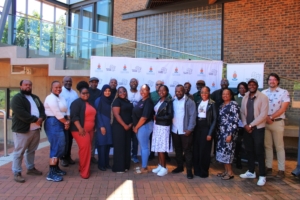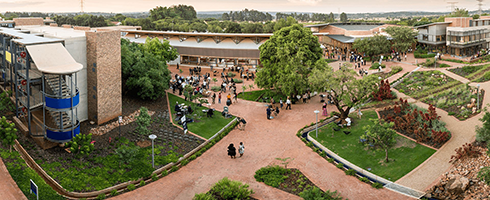You are here: Home1 / Challenge Domains2 / Sustainability Transformations in Africa3 / New Future Africa learning lab reimagines people–nature relations in A...
New Future Africa learning lab reimagines people–nature relations in Africa
Future Africa at the University of Pretoria (UP) recently launched the African Political Ecologies (APE) Learning Lab, a new platform for African researchers to shape global understanding of sustainability, nature and society through locally grounded perspectives.
The lab is led by Professor Maano Ramutsindela, Future Africa Research Chair in Sustainability Transformations (a joint initiative of UP and the University of Cape Town), in partnership with the Future Earth Africa Hub Leadership Centre. It aims to be a space where researchers and members of civil society can develop and test ideas, formulate research questions, and identify themes for seminars, workshops and conferences.
Prof Ramutsindela described the lab as an informal, participatory environment that encourages open exchange and shared learning across disciplines.
“We are not here to be limited by titles or hierarchies; we are just people, engaging in ideas that matter,” he said. “What we should be looking at is how we resist but stay the course – how we can sustain ideas that advance political ecology rooted in African situations, realities and questions.”
The launch focused on two central questions: What makes the study of society-nature relations distinctly African, even when similar relations are studied elsewhere; and what overarching questions should African researchers prioritise in political ecology?
It was attended by researchers, academics and students from a wide range of institutions, including the University of Technology in Mauritius; University of Botswana; University of Dar es Salaam; University of Zimbabwe; University of KwaZulu-Natal; University of Venda; Stellenbosch University; and UP’s Centre for the Advancement of Scholarship, Forestry and Agricultural Biotechnology Institute.
The event featured a full-day programme of discussions and presentations on themes such as indigenous knowledge systems, urban resilience, and the politics of land and ecology. Participants emphasised the need to strengthen African-led approaches to studying the interconnections between society and the environment.
Prof Wanda Markotter, Interim Director of the Future Africa, opened the event by highlighting the importance of collaboration and leadership in shaping Africa’s research agenda.
“One of our aims at Future Africa is to foster dialogue for action to change how we do research for Africa,” she said. “Africans need to lead, and we need to make decisions around indicators, health and climate that are informed by our own contexts.”
Researchers or scholars interested in joining the APE Learning Lab can contact Prof Maano Ramutsindela at ramutsindela.maano@up.ac.za.




